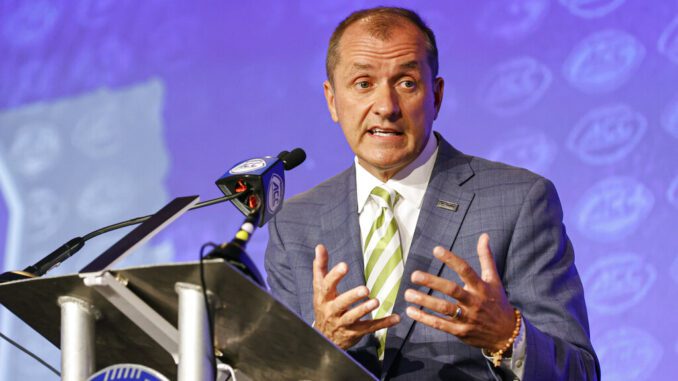
ACC Commissioner Jim Phillips’ slip of the tongue was perhaps a sign of the times in college sports.
In discussing ways to improve the conference’s revenue stream to make it more competitive with the newly expanded SEC and Big Ten, Phillips said he would do what was best “for our 17 teams.” He then caught himself and corrected it to 15 teams.
A few minutes later, he clarified again.
The ACC has 14 teams for football.
“I’ve been focused on expansion,” Phillips joked.
He’s not alone. The entire college sports industry has been focused on expansion as the NCAA appears to be on the verge of consolidating into two large haves, and a vast ocean of have-nots.
A year after the SEC threw the first punch in the latest college realignment frenzy, taking Texas and Oklahoma from the Big 12, the Big Ten countered by raiding the Pac-12 for USC and UCLA. The resulting landscape shows the SEC and Big Ten as the clear front-runners, packed with the best programs from coast to coast, the Big 12 and Pac-12, former power conferences, scrambling to survive, and the ACC teetering on the brink as it ponders its next step.
So far, the ACC has stood pat, but it’s not a place that Phillips or the conference can remain.
So at the ACC Kickoff, Phillips used his “state of the league” address to stand in front of the oncoming tanks and throw up his hand.
During his half-hour opening statement, Phillips railed against the consolidation of college sports around football, extolling the importance of the nonrevenue-generating Olympic sports.
“They forget that we field teams beyond football and men’s basketball,” Phillips said. “College athletics happens within the context of higher education. For decades, we’ve relied on the financial power of those two sports.”
Phillips was defiant that sports at the college level shouldn’t be a feeder system or minor league for pro teams.
“Those who clamor for a pay-for-play system disregard the collegiate principles of diverse offerings,” he said. “We are not the professional ranks. This is not NFL or NBA lite. This is not, or should not be, a winner-take-all structure. … College athletics has never been elitist or singularly commercial.”
As a member of the five power conferences that dominated football and men’s basketball over recent years, the ACC appears to be at risk of being on the outside looking in.
“I’ll continue to do what’s best for the ACC but will also advocate for a healthy neighborhood in college athletics,” Phillips said. “Not just for two or three gated communities.”
Standing in front of the line of tanks is an admirable position, heroic even, but that assumes that the tanks stop for you. And the big question is whether it’s too little, too late. Was Phillips calling for a return to the days of yore quaint and outdated given the momentum the two-conference model has built up, and the money firing the engines to have it continue? Even as Phillips spoke, rumors had been swirling that some of the top programs in his league are fielding offers from one or both super conferences.
The position is also undermined when, until recently, you were among those driving a tank. Phillips admitted as much in his comments.
“We’re probably in a gated community,” he said. “One of five. We’re going to try to find new ways to generate revenue for our conference, but it can’t be at the expense of all the other things we’re doing.”
And, as Phillips stands with his hand extended, he seems to be looking around for an unoccupied tank that someone may have left unattended.
He said the ACC is exploring all options for expansion and trying to find ways to hike TV revenue to be more competitive with the SEC and Big Ten. That means doing some raiding of its own and renegotiating TV deals.
It also means wooing Notre Dame.
Already an ACC school in everything but football, retaining the Irish appears to be crucial to any plan to keep the ACC relevant.
“If there comes a time that Notre Dame would consider moving to a conference, I feel really good about it being the ACC,” he said.
So the message coming from ACC Kickoff and the league office — which, fittingly, is currently adrift, looking for a new home — is an unequivocal “Stop the madness … or let us participate. One of the two.”
“This is no time to be waving the white flag,” Phillips said. “I’m not trying to be Pollyannish. I live in the real world. Times change.”



